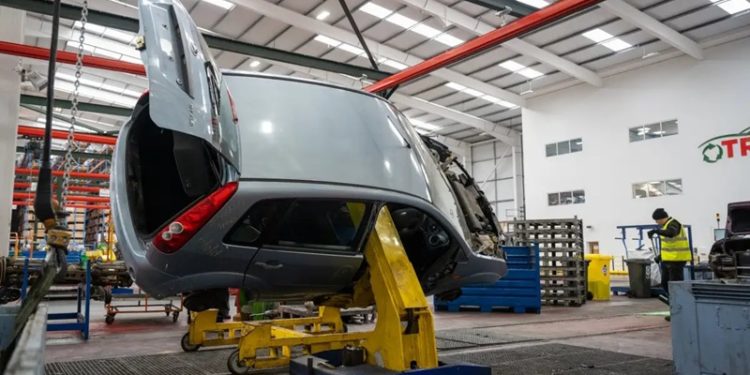The automotive recycling industry stands at the threshold of a technological revolution that promises to transform how we approach car scrapping and vehicle disposal. As vehicles become increasingly complex and incorporate advanced materials, the traditional methods of dismantling and recycling cars are evolving to meet new challenges and opportunities. From artificial intelligence-powered sorting systems to blockchain-based tracking technologies, the future of car scrapping is being shaped by innovations that will dramatically improve efficiency, environmental impact, and resource recovery rates.
The Digital Transformation of Vehicle Recycling
Digital technologies are fundamentally changing how vehicle scrapping operations manage information, track materials, and optimise processes. Advanced database systems now enable recycling facilities to maintain detailed records of vehicle components, their condition, and market demand, allowing for more strategic decisions about which parts to refurbish for resale versus processing for raw materials. These systems can predict market trends for specific components, helping facilities maximise value recovery from each vehicle.
Internet of Things sensors integrated throughout recycling facilities provide real-time monitoring of equipment performance, environmental conditions, and material flow rates. This continuous data collection enables predictive maintenance programmes that reduce downtime whilst ensuring optimal processing efficiency. Smart sensors can also monitor the composition of material streams, automatically adjusting sorting parameters to improve separation quality and reduce contamination in recovered materials.
Cloud-based platforms are enabling better coordination between different stakeholders in the vehicle recycling supply chain, from collection services to parts distributors to raw material processors. This enhanced connectivity reduces inefficiencies, minimises transport costs, and creates more transparent markets for recycled automotive materials. Digital platforms also facilitate better matching between parts suppliers and buyers, extending the useful life of recovered components.
Artificial Intelligence and Machine Learning Applications
Artificial intelligence is revolutionising the precision and efficiency of material identification and sorting in car scrapping operations. Computer vision systems powered by machine learning algorithms can now identify different materials, components, and contamination levels with accuracy that exceeds human capabilities. These systems can distinguish between various grades of steel, aluminium alloys, and plastic types, enabling more precise sorting that improves the quality and value of recovered materials.
Machine learning algorithms analyse vast amounts of data from vehicle processing to optimise dismantling sequences and improve material recovery rates. By learning from thousands of vehicle processing cycles, these systems can identify the most efficient approaches for different vehicle types and configurations. This optimisation reduces processing time whilst maximising material recovery, leading to improved profitability and environmental outcomes.
Predictive analytics powered by AI help recycling facilities forecast demand for specific components and materials, enabling better inventory management and strategic planning. These systems can predict seasonal variations in parts demand, market price fluctuations for different materials, and optimal timing for processing different types of vehicles. This intelligence allows facilities to maximise revenue whilst minimising waste and storage costs.
Robotic Automation in Vehicle Dismantling
Robotic systems are increasingly being deployed for specific dismantling tasks that require precision, consistency, or involve hazardous materials. Automated fluid drainage systems can safely and completely remove oils, coolants, and other automotive fluids without human exposure to potentially dangerous substances. These robotic systems also ensure more complete fluid recovery, improving both environmental compliance and material value recovery.
Advanced robotic arms equipped with specialised tools can remove specific components more efficiently than manual processes. These systems are particularly valuable for removing catalytic converters, airbags, and electronic components that require careful handling or pose safety risks. Robotic dismantling also enables processing during extended hours without human operator fatigue, increasing facility throughput and efficiency.
Collaborative robots designed to work alongside human operators are enhancing productivity whilst maintaining the flexibility needed for the varied nature of vehicle processing. These systems can handle repetitive tasks whilst human workers focus on complex decision-making and quality control activities. The combination of human expertise with robotic precision creates more efficient and safer working environments.
Advanced Material Separation Technologies
Technological advances in material separation are enabling higher recovery rates and better quality in recycled materials from car scrapping operations. Optical sorting systems using near-infrared spectroscopy can identify and separate different types of plastics with remarkable precision, enabling recovery of materials that were previously difficult to recycle. These systems can process mixed plastic waste streams and separate them into pure material types suitable for remanufacturing.
Magnetic separation technology continues to evolve with stronger and more precise magnetic systems that can recover even small ferrous components from mixed waste streams. Advanced eddy current separators are becoming more effective at recovering non-ferrous metals including aluminium, copper, and precious metals from catalytic converters. These improved separation technologies increase overall material recovery rates whilst reducing contamination in final products.
Density separation techniques using air classification and water-based systems are being refined to separate materials based on their physical properties more effectively. These technologies are particularly valuable for processing automotive shredder residue, the material remaining after magnetic and eddy current separation, to recover additional valuable materials that would otherwise be disposed of as waste.
Electric Vehicle Recycling Innovation
The growing prevalence of electric and hybrid vehicles is driving innovation in specialised recycling technologies designed to handle high-voltage battery systems and electric drivetrain components. Automated battery disassembly systems are being developed to safely remove and process lithium-ion batteries, recovering valuable materials including lithium, cobalt, and rare earth elements whilst minimising safety risks to workers.
Hydrometallurgical and pyrometallurgical processes are being refined to extract maximum value from electric vehicle batteries, with some advanced facilities achieving recovery rates exceeding 95% for critical materials. These processes not only recover valuable metals but also produce materials suitable for manufacturing new batteries, creating true circular economy loops in electric vehicle production.
Specialised handling systems for electric motors and power electronics are enabling recovery of rare earth magnets and precious metals used in these components. As these materials become increasingly valuable and supply-constrained, their recovery from end-of-life vehicles becomes economically attractive and environmentally essential. Advanced processing techniques can separate and purify these materials for reuse in new vehicle manufacturing.
Blockchain and Traceability Systems
Blockchain technology is beginning to provide unprecedented traceability and transparency in vehicle recycling supply chains. These systems can track individual vehicles from collection through final material disposition, creating immutable records of processing activities and material flows. This transparency helps ensure compliance with environmental regulations whilst providing valuable data for optimising recycling processes.
Smart contracts built on blockchain platforms can automate transactions and compliance reporting throughout the recycling process, reducing administrative costs whilst ensuring accurate record-keeping. These systems can automatically trigger payments when specific processing milestones are reached and generate compliance reports required by regulatory authorities.
Digital certificates of destruction and material provenance can be securely managed through blockchain systems, providing definitive proof of proper vehicle disposal and creating verifiable chains of custody for recycled materials. This technology addresses growing demand from manufacturers for verified sustainable materials whilst providing legal protection for vehicle owners.
Advanced Chemical Recycling Processes
Chemical recycling technologies are being developed to handle complex automotive materials that have traditionally been difficult to process, including multi-layer plastics, composite materials, and adhesive-bonded assemblies. Pyrolysis processes can break down complex plastic mixtures into basic chemical building blocks that can be used to manufacture new plastics with properties equivalent to virgin materials.
Solvent-based separation processes are being refined to separate different materials from composite assemblies without degrading their properties. These techniques are particularly valuable for processing carbon fibre composites and other advanced materials used in lightweight vehicle construction. Successfully recycling these materials maintains their high value whilst reducing the environmental impact of vehicle lightweighting strategies.
Bio-based chemical processes using engineered enzymes and microorganisms are showing promise for breaking down specific automotive materials under controlled conditions. These biological recycling processes could provide environmentally friendly alternatives to energy-intensive chemical recycling methods whilst achieving high material recovery rates.
Data Analytics and Process Optimisation
Big data analytics are enabling car scrapping operations to optimise their processes based on comprehensive analysis of vehicle types, market conditions, and operational performance. These systems can identify patterns in vehicle composition, predict processing challenges, and optimise facility layouts for maximum efficiency. Data-driven insights help facilities adapt to changing vehicle technologies and market demands.
Real-time analytics enable dynamic pricing for collected vehicles based on current material markets, processing capacity, and seasonal demand variations. This responsiveness helps maximise revenue whilst ensuring competitive pricing for vehicle owners. Analytics also help facilities optimise their inventory management, reducing storage costs whilst ensuring adequate supply of high-demand components.
Performance monitoring systems track key metrics including material recovery rates, processing times, energy consumption, and environmental compliance indicators. This continuous monitoring enables rapid identification of improvement opportunities and ensures consistent performance standards across different shifts and operational conditions.
Integration with Circular Economy Platforms
Technology platforms are emerging that connect vehicle recycling operations with manufacturers seeking recycled materials, creating more efficient circular economy networks. These platforms can match specific material specifications with available recycled content, enabling manufacturers to source sustainable materials more easily whilst providing stable markets for recycling facilities.
Digital marketplaces for used automotive components are expanding their reach and sophistication, enabling better matching between parts suppliers and buyers whilst providing transparent pricing and quality information. These platforms extend the useful life of automotive components whilst providing additional revenue streams for recycling operations.
Lifecycle assessment tools integrated with recycling operations provide detailed environmental impact data for recycled materials, enabling manufacturers to make informed decisions about material sourcing whilst meeting sustainability targets. This data integration supports the growing demand for verified environmental performance in manufacturing supply chains.
Challenges and Future Developments
Whilst technological advancement promises significant improvements in car scrapping efficiency and environmental performance, several challenges remain. The increasing complexity of modern vehicles requires continuous investment in new processing technologies and worker training programmes. Facilities must balance the costs of technological upgrades with the benefits of improved processing capabilities and material recovery rates.
Regulatory frameworks need to evolve to address new recycling technologies and the changing composition of end-of-life vehicles. Standards for processing electric vehicles, handling new materials, and ensuring data security in digital systems require ongoing development and harmonisation across different jurisdictions. Industry collaboration with regulatory authorities will be essential for creating frameworks that encourage innovation whilst protecting environmental and consumer interests.
The economic viability of advanced recycling technologies depends on sufficient scale and stable markets for recycled materials. Continued growth in electric vehicle adoption, lightweighting trends, and circular economy initiatives will drive demand for advanced recycling capabilities, but facilities need confidence in long-term market conditions to justify significant technology investments.
Conclusion
The future of car scrapping is being transformed by technological innovations that promise to dramatically improve the efficiency, environmental impact, and economic value of vehicle recycling operations. From AI-powered sorting systems to blockchain traceability platforms, these technologies are creating more sophisticated and sustainable approaches to end-of-life vehicle management. As vehicles continue to evolve with new materials and technologies, the recycling industry is adapting with advanced solutions that ensure maximum resource recovery whilst minimising environmental impact.
The successful integration of these technologies will be crucial for creating truly circular automotive industries that minimise waste whilst maximising the value recovered from every scrapped vehicle. The ongoing technological revolution in car scrapping represents not just an industrial transformation but a fundamental shift towards more sustainable transport systems.










































































